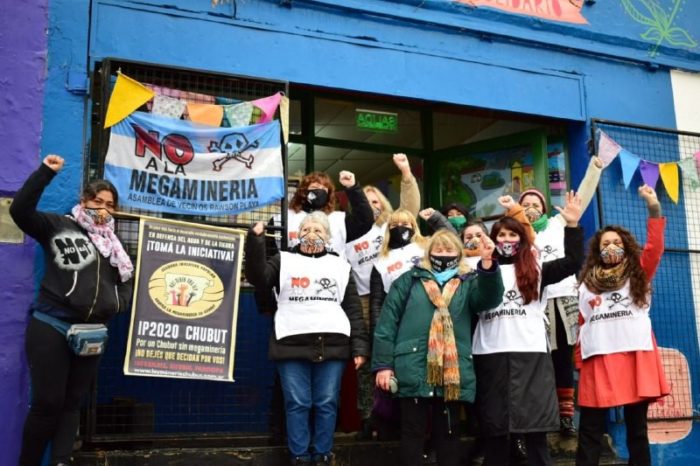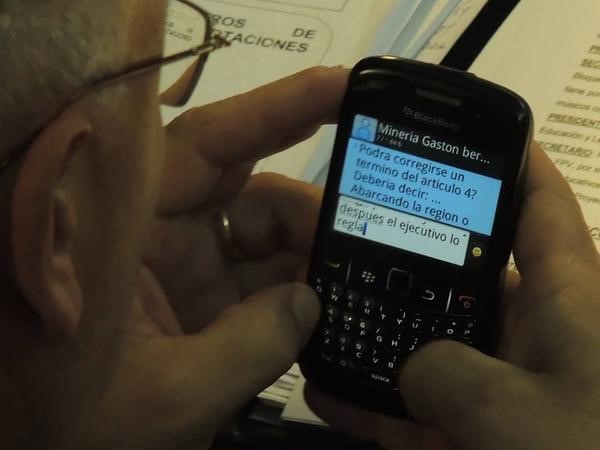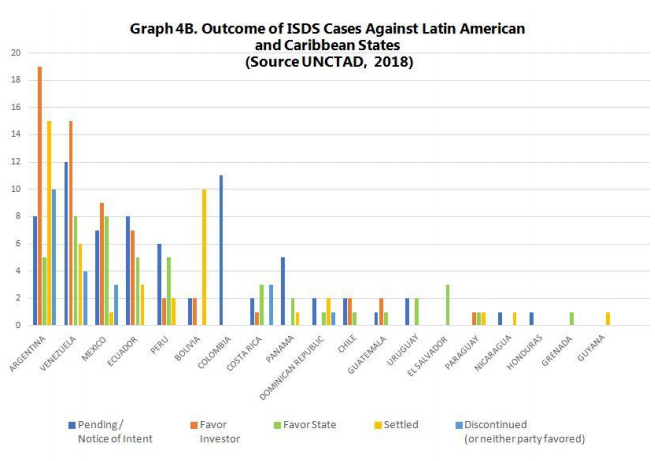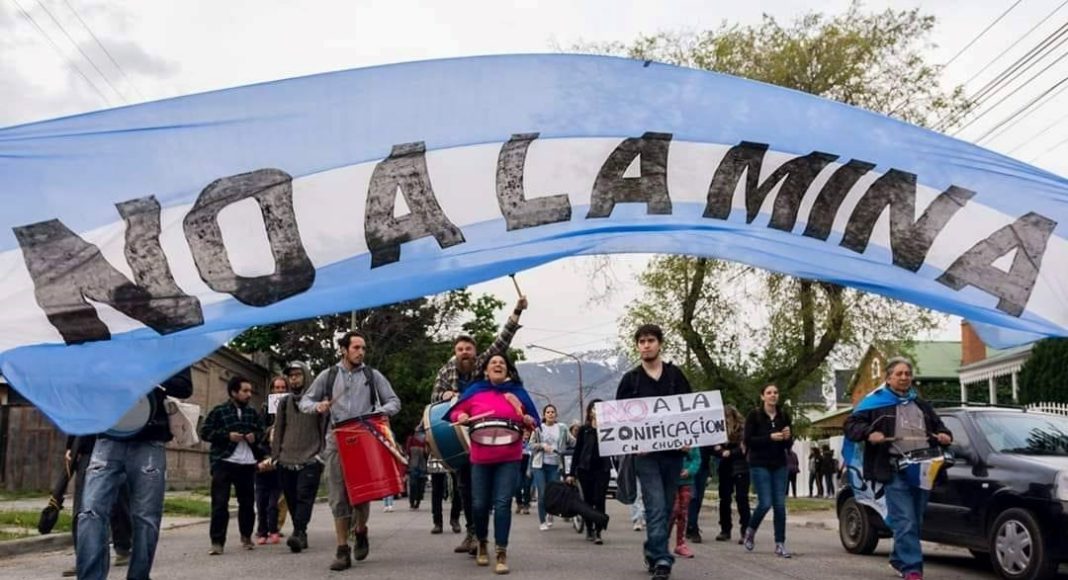’We are the people of the territory that suffers and is exhausted; the one that is crushed by the political-economic power that leaves us even without the most vital element: water. We fight for a law that guarantees pure water to all residents of Chubut; but also, to express to the governors and businessmen that metal mining in Chubut does not have a social licence’ – Unión de Asambleas de Comunidades Chubutense
For almost 20 years now Chubut has been fighting the Canadian mining giant Pan American Silver (PAS). Project Navidad, located in Patagonian plateau, is one of the largest unexploited deposits of silver in the world. It was acquired in 2010, despite the fact that the provincial Law 68 of 2003 (also known as Law 5001) prohibits ‘open pit mining and the use of cyanide in mineral processing’. The company routinely lobbies local and national authorities to change the law in favour of the mining activity. In response, civil societies have organised to draw attention to the lack of social consent and to demand that the authorities strengthen the legislative framework to protect the environment, public health and well-being.
‘Second Popular Initiative’ to protect the province
‘[for] a law based on the principles of prevention, precaution, sustainability and intergenerational equity, principles that must guarantee the present and the future, that must prevent the collapse of nature, that must modify the anthropocentric direction of human activities and thus to be able to locate ourselves in a balance with all the other beings that inhabit the planet .’
Call for the Iniciativa Popular
The Union of Assemblies of Communities of Chubut launched the second campaign for the Popular Initiative (Iniciativa Popular), which would enshrine in law protections for the province from the mining companies.
Popular Initiative is a civic right drafted in the provincial constitution (art.263) which allows citizens to present a bill to be debated in parliament, as long as they gather support from more than three per cent of the electoral roll. On 22 June, the assemblies across the province started to collect signatures.

The most important addition to the new law is a blanket ban on mining in all its stages: prospecting (search), exploration (defining the value), development (opening for production), exploitation (large-scale production) and reclamation (restoration of the land).
The existing Law 68 does not specify all of these stages with the result that mining companies take advantage of this legal loophole. Pan American Silver has remained in Chubut for years in the exploration stage trying to convince people and lobby government officials to amend the existing law so that they can move forward with the project.
The governor of Chubut, Mariano Arcioni, declared earlier this year that he intends to modify the provincial regulations in favour of mining activity which, he said, ‘is the backbone of a strategic plan for economic growth and social development’. President Alberto Fernandez has also expressed his support for mineral exploitation, ‘the issue of mining is of paramount importance (…) this is where our wealth is, it is to intelligently open ourselves to the world ’.
Zoning – the thin end of a massive wedge
Chubut had already become a national paradigm of resistance to mining ventures. The land is rich in natural resources and thus it has always been a target for mining industries in pursuit of profit. The first Popular Initiative was held in 2014. Although the Union of Assemblies had collected enough signatures, the attempt failed because of an attempt to falsify the text of the proposed law while it was being debated. Deputy Gustavo Muñiz, was caught receiving text messages with instructions from the manager of the Yamana Gold mining, Gastón Berardi.
‘Can one term in Article 4 be corrected? It should say: encompassing the region or… ‘, suggests Berardi. ‘The executive board will fix it later,’ responded Muñiz.

The modified content was supposed to include zoning of the province so that land in the province could be divided into zones in which mining activities would be allowed and those where it was prohibited. At that time about 66 per cent of the plateau was to be sacrificed by inclusion in the ‘permitted’ zone, including a vast territory belonging to Mapuche-Teheuche communities.
Today, Pan-American Silver is trying the same trick under the label of ‘sustainable mining’.
They talk about zoning, but ecosystems cannot be zoned. If rivers that start in the mountains are affected, pass through the plateau and reach the east coast, as in these cases, they should also consult Trelew, Puerto Madryn or Comodoro Rivadavia .
Corina from the Union of Assemblies.
Consent to exploitation
Zoning will allow the mining companies to negotiate a Social Licence for Operation more easily. This licence is based on an international standard which requires companies to acquire community consent to conduct their business. Mining activity often causes negative externalities, leaving behind political, social and environmental implications. Nonetheless, the companies, instead of ensuring transparency and being explicit as to how human rights will be protected, try to convince locals that the only way to stimulate economy in the region is by mining.
PAS’ website claims that its core values are ‘caring for the environment in which we operate, contributing to the long-term development of our host communities, ensuring safe and secure workplaces for our employees, partnering with our employees, local communities and government, and operating transparently’. Nonetheless, according to indigenous communities living on the lands of the Navidad project, ‘In no case were our right to free, prior and informed consultation of the Indigenous Peoples respected, as required by the Convention 169 of the International Labour Organization (art. 6 and 15), and other human rights declarations which Argentina has ratified. These should have been especially respected, since these projects would affect us all’ .
Instead of development, Pan American Silver has brought to the communities where it operates social disruption, polarisation, environmental crisis, loss of livelihoods and poverty. For example, in Santa Cruz PAS had guaranteed that at least 70 per cent of the jobs in the mine would be distributed locally. Instead they employed unskilled foreign workers.
Moreover, the company has failed in regard to health and safety. The Argentine Mining Association denounced ‘the risky conditions in terms of support systems, refuge and essentially the lack of maintenance of equipment that is in deplorable condition.’ In Huayllay, Peru, PAS was fined seven times for violation of environmental regulations by the Environmental Evaluation and Accounting Office (OEFA). Thus, behind the surface discourse of sustainable development and responsible mining lie the iron laws of extraction, exploitation and the ever-expanding reach of global capital.
The Natural Resource Trap
The abundance of natural resources in a country seldom translates into the welfare of its citizens. Paul Collier in his book The Bottom Billion talks about the ‘natural resource trap’, a paradox which implies that an economic system based on exploitation of natural resources, especially in poorer countries, slows down development and economic growth so that in the long run countries become poorer than before the exploitation began.
The case of San Juan
The Argentine province of San Juan is considered to be a ‘national model for mining’, with 15 years history of mineral exploitation. Yet a report by INDEC shows that in 2019 San Juan remained among the ten poorest urban agglomerations in Argentina, with 30.3 per cent of its people below the poverty line and 6.3 below extreme poverty line. According to the Ministry of Labour, Employment and Social Security, in 2016-17 the mining and fossil fuels sector generated 2,789 jobs, which is only 0.89 of the total number of jobs. Carlos Ibarbe from the organisation Jachal No Se Toca affirms that years ago the department used to be known for its agriculture and livestock which have now been destroyed because of the mining.
‘Jachal is a productive livestock and agricultural area and what the government did with the complicity of the [mining] company was to push the countryside into crisis in order to have an unemployed workforce, despite knowing that we have good soil and water to cultivate. Afterwards they say that the only way out is by mining. That’s a lie, the countryside is destroyed, there is no workforce for the fields and beyond that the water is spoiled. Now we don’t have means to produce, and who will eat the products where the water is so contaminated?’
While the mine provides some temporary employment, it also destroys other sectors which, once the exploitation of minerals ends, will leave communities without essential sources of livelihood. Between 2012-2017 the number of agricultural companies in the province decreased by 14.3 per cent.
However, it is not the natural resources themselves which are the problem, but their irresponsible management aided and abetted by the lack of any legal framework to determine how resources should be developed and translated into economic wealth. Thus the natural resource trap is likely to occur in countries with weak institutions and high levels of corruption, with the additional adverse consequence that wealth once promised to the local community is distributed among the few in power.
The Corruption Perception Index developed by Transparency International, gave Argentina a score of 45 out of 100, where the lower the score the higher the level of corruption in public sector. Other extractive economies in the region received even lower scores, such as Peru (36) and Brazil (35). The exception is Chile (67), which is among the least corrupt countries in Latin America. In contrast, Western countries which invest in mineral exploitation in Latin America are situated on the other end of the spectrum Canada has 77, UK 77, France 69. Weak institutions give an advantage to profit-seeking companies, which are far more concerned with increasing their own revenues than creating any benefits for society. Lobbying a government to appropriate a particular source of revenue is a common form of profit-seeking activity.
Company ‘rights’ before the needs of the community and the environment
However, the ‘natural resource trap’ in the context of Latin America cannot be understood without consideration of historical North-South power dynamics. The extraction-based development model is a product of the neo-liberal economic system and free trade agreements which foster foreign direct investment and allow transnational exploitation of natural resources, as, for example, in the Canada-Argentina Foreign Investment Promotion and Protection Agreement.
These agreements establish arbitration tribunals which enable corporations to sue governments at all levels if their policies diminish the companies’ profits. A study by UNCTAD from 2018 shows that Argentina has the largest number of disputes resolved through the International Centre for the Settlement of Investment Dispute (ISDS) and the highest number of cases won by investors. For example, the dispute between Mobile Exploration and Development and Republic of Argentina from 2004 was resolved in favour of investors in 2016. The company claimed the government had violated the Bilateral Investment Treaty between Argentina and USA, specifically by its failure to encourage and protect investment and fair and equitable treatment.

This parallel legal system was designed to enable corporations to pursue their interests and secure immunity from penalties for the human and environmental rights violations they commit. It diminishes the power of government decision making and seriously threatens state soverneignty and democratic institutuions. As a consequence, even if governments wish to protect their citizens they often lack the resources and legal expertise to enter into and pursue a dispute with transnational companies.
The backlash against this type of free trade agreement is growing worldwide. UK NGO War on Want has been campaigning for many years against The Transatlantic Trade and Investment Partnership (TTIP), Comprehensive Economic and Trade Agreement (CETA) and recently The Trans-Pacific Partnership (TPP), which are founded on similar principles as Argentina’s bilateral investment treaty. These deals were discussed behind closed doors and War on Want demands that they be debated in the UK parliament to ensure transparency of the negotiation. The involvement of civil societies is crucial in this struggle as they press the government to include citizens in decision-making. After all democracy is a system based on people’s power, thus decisions should be taken in accordance with people’s will and to foster wellbeing, not to line the pockets of corporate elites.

